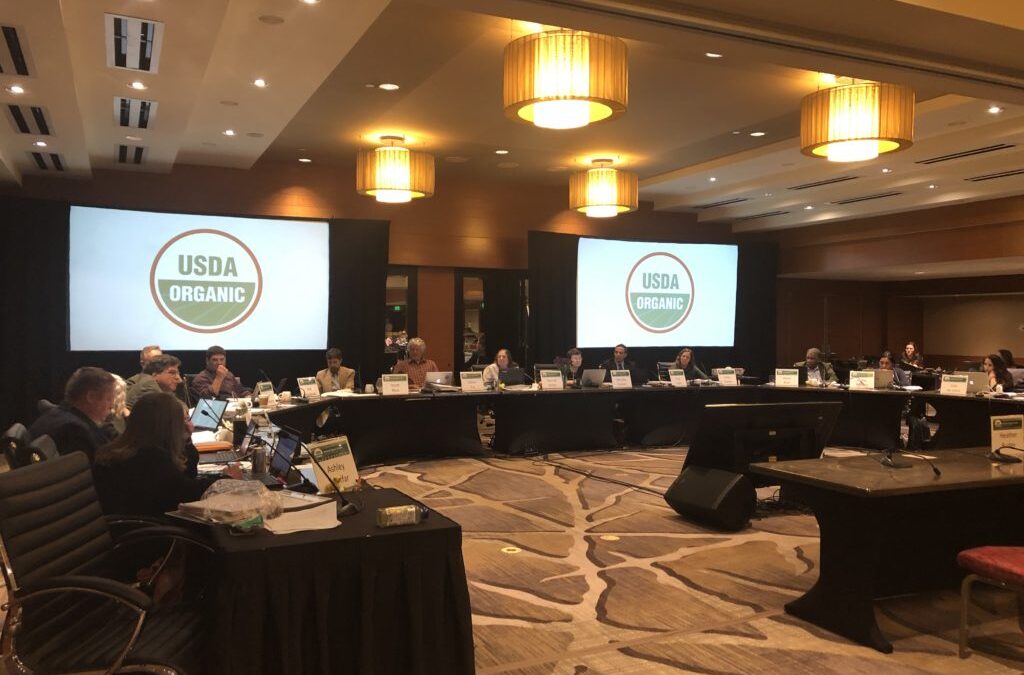After listening to public testimony for two days last week, the National Organic Standards Board commenced their fall meeting in Sacramento bright and early this morning (Tuesday, October 25).
NOSB Director Dr. Jennifer Tucker presented the usual program update and then answered questions from NOSB members. Our biggest take-away was the fact that, according to Dr. Tucker, only 1-2% of violations of the standards, including fraud cases, are ever referred to an Administrative Law Judge for adjudicating penalties. Their default is to enter into “settlements” often much more lenient than the originally proposed penalties.
OrganicEye’s take: All “willful” violations of the law should include aggressive prosecution and only be resolved through settlement agreements when penalties and fines are substantive. Furthermore, these need to be made public in real time through press releases so that the marketplace can apply its own penalties for violating the trust of the public. Reporting on enforcement cases is currently done on a quarterly basis and buried in the minutia of voluminous information released by the NOP.
During the questions, board member Rick Greenwood, with support from fellow board member Gerard D’Amore, asked for guidance from the program as to whether or not the prohibition against GMOs in organic food production might be revisited.
OrganicEye’s take: This is truly one of the third rails in organic philosophy and a benchmark in terms of the success of marketing organic food. The most important arbiters here are the consumers. They are choosing organic as a safe haven, not wanting to experiment with the health and well-being of their families.
We will be communicating with Mr. Greenwood and Mr. D’Amore suggesting they contact Dr. Michael Hansen with Consumers Union. The last time we checked with Dr. Hansen, he confirmed that there have never been safety tests conducted on humans and only very short-term tests on laboratory animals with GMO feed. There’s a good reason the governance of organics is shaped by the “precautionary principle.”
Board member Amy Bruch asked the program how the transition of Indian imports was going after the “equivalency agreement” between the US and India was withdrawn after endemic levels of fraud were suspected. Dr. Tucker reported that only 1200 of the 4000 operations previously certified by India had recertified under the NOP. Ms. Bruch added that there is compelling evidence to believe Indian soybeans are being “trans shipped” through Canada to the US after being processed into soy meal (livestock feed).
OrganicEye’s take: We applaud the important issue brought up by board member Bruch and continue to be concerned with how porous the US borders are in terms of fraudulent organic imports. There’s a lot of strong talk about “organic integrity” but there continues to be serious evidence that domestic organic farmers are being placed at an unfair disadvantage and consumers are being defrauded.
The board voted in support of a proposal to ask the USDA to secure technical support for the volunteer board members. The proposal included prohibiting the NOP itself from providing technical/scientific personnel, recommending they exclusively be assigned from other areas of the USDA. The board also voted in favor of standardizing the organic systems plans which would make it easier for inspectors across the country to operate.
OrganicEye’s take: The technical support resolution is a meritorious proposal, as is the OSP recommendation, although we wished that the NOSB had retained the power for the final approval in the selection process as these are advisors to the board. Leaving it exclusively up to USDA staff could skew the decision-making process.

